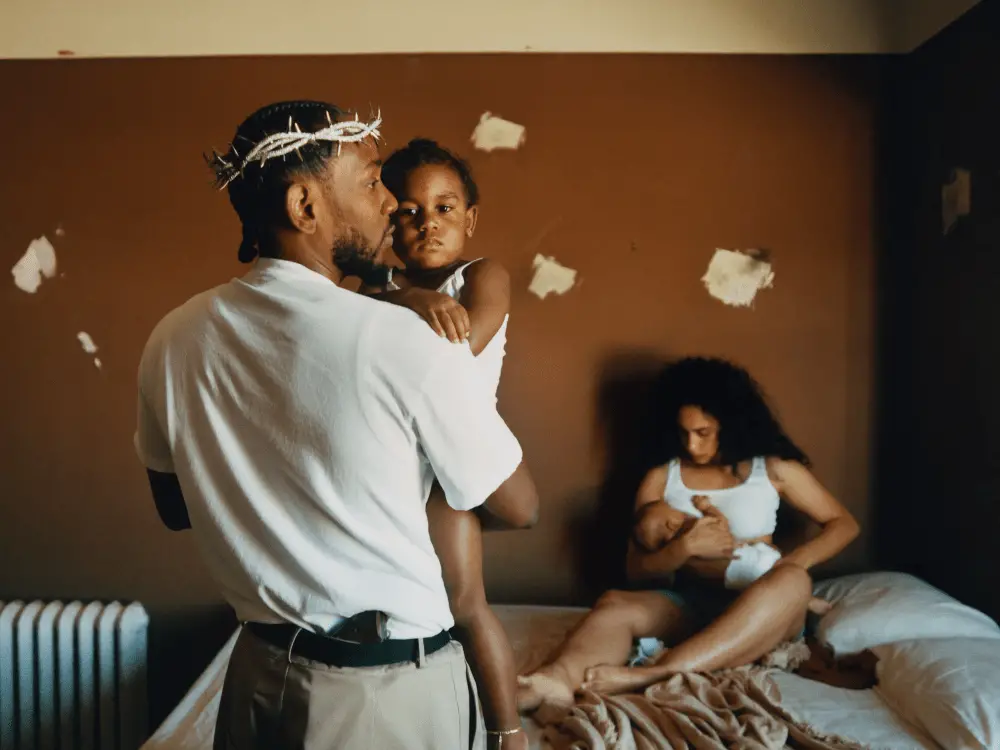Whether it’s the supposedly bland production, lack of hits or even offensive songwriting, there are myriad reasons why one might not like Kendrick Lamar’s “Mr. Morale & the Big Steppers.”
This is the most significant backlash Kendrick Lamar has ever experienced in his career, but I personally couldn’t disagree with the critics more. To some degree, a lot of these criticisms ring true. There are a lot of things that “Mr. Morale & the Big Steppers” isn’t. It’s not “To Pimp a Butterfly” with genre-bending, risk-taking instrumentals and forward-thinking song structures. It’s not “good kid. m.A.A.d city” with its intricate storytelling and rich world-building. It’s not “DAMN.” with massively viral hit songs.
Throughout the course of “Mr. Morale & the Big Steppers,” Kendrick repeatedly wrestles with ideas like self-improvement, mental health, family dynamics and personal and cultural trauma. It’s a masterfully complex and poignant look into Kendrick’s psyche. On the album, Kendrick relies on his intelligence and introspective poetic writing ability to interpret his family’s life experience in a way that’s more meaningful than anything he’s done before.
The Cover
The cover art for Kendrick Lamar’s “Mr. Morale & the Big Steppers” is rife with symbolism. Kendrick stands in front of his wife and newborn baby — putting up a barrier between the public and his private family life. At the same time, he stares out the window closely watching the world around him.
In the Bible, the crown of thorns was meant to humiliate Jesus — to show that he is a fraud and a false king. Here, Kendrick wears it for the same reason. One of the main themes of “Mr. Morale & the Big Steppers” is that Kendrick isn’t a savior, but a person with flaws and trauma the same as everyone else. In a way, the cover art is a spiritual successor to the cover for Kendrick’s sophomore album, “good kid, m.A.A.d city.” Kendrick and his wife are holding their children, but this time there are no gang signs or liquor bottles. The kids on the cover of “Mr. Morale & the Big Steppers” are being loved and cared for. The gun in Kendrick’s waistband is visible but not being flashed; it is there if he needs to protect his family. The cover beautifully represents the album’s themes of humility, family and overcoming one’s painful past.
The Controversy Surrounding the “Mr. Morale & the Big Steppers”
The Inclusion of Kodak Black
There are a couple of things about Kodak Black that make him a questionable inclusion on the record. On “Savior,” Kendrick sees himself in the controversial Kodak, and essentially uses him as a poster child for transformation. Kendrick understands that his audience adores him and will know that he is undergoing some sort of metamorphosis no matter what he releases. On “Rich (Interlude),” Kodak realizes the toxicity of his past and implies that he is going through his own metamorphosis. Here, Kendrick presents a challenge to his audience. He’s asking them to question whether Kodak can undergo the same change as Kendrick — just as everyone else.
Some may argue that Kodak’s inclusion on the album is perfectly implemented, but it wouldn’t take an overly charitable interpretation to get where Kendrick is coming from.
It does feel less disgusting than, let’s say, Kanye West and his inclusion of Marilyn Manson on “Donda”; Manson is a man who’s proven himself to be completely unrepentant for his heinous actions and has served zero jail time.
A big thing that is missing from the American consciousness is the belief in redemption. Americans harbor an incredibly draconian obsession with punishment, but the burden disproportionately falls on Black men, guilty or innocent. The question is, how is one to redeem themselves? “Mother I Sober” is the very track where Kendrick goes over these cycles of intergenerational abuse specific to the Black community dating back hundreds of years.
Kendrick portrays himself as someone who was locked into that cycle, and he wants the audience to see that Kodak is somebody who’s a victim of that cycle as well.
Now, Kodak’s crime is one of the worst things a person can do, a crime to which he pled guilty. It’s a dangerous and difficult case to make that this man is capable of redemption but Kendrick still chose to go that route. It seems that the challenge was the point.
“Auntie Diaries”
In a lot of circumstances, when artists try to empathize with the experiences of other marginalized communities from the framework of their own personal viewpoint, it’s often really limited and comes out terribly. A great example of this would be Macklemore’s “Same Love.”
Let’s take a quick look at the opening lines of two tracks. Kendrick starts off “Auntie Diaries” with his own personal experience of having close transgender family members and learning to accept their identity. On the other hand, Macklemore’s rationale for discussing same-sex relationships is revealed in the line, “When I was in the third grade, I thought I was gay.”
It doesn’t seem like Kendrick is trying to speak for or speak over anyone in the trans community. At the end of the day, he means to humanize the figures in his life who share the trans experience. Kendrick doesn’t really get into the politics of it as much as he gets into his personal experience with gender identity as a cisgender person. “Auntie Diaries” is a work of art directed toward people in his community who have yet to accept those that are a part of the LGBTQIA+ community. It’s certainly a breath of fresh air compared to Dave Chapelle, for example, who takes any opportunity to make jokes at the trans community’s expense.
Kendrick’s Vulnerability Becomes His Strength on “Mr. Morale & the Big Steppers”
For the past seven or eight years, Kendrick’s music has always been very outwardly focused. He has always told stories about his environment and commented on current events and the culture around him in a very overt, often empathetic, way. It’s almost like Kendrick was providing therapy for the world by telling the stories of his people. He even said it on the first track of “untitled unmastered.”: “To use my vocals to save mankind for you/ Say I didn’t try for you/ Say I didn’t ride for you.” For example, during the George Floyd protests a couple of years ago, people in the streets played songs like “HUMBLE,” “Alright” and “The Blacker The Berry” over loudspeakers. It says a lot that people have become so accustomed to his commentary that they call on him to create more music.
So now that he is finally dropping new music, five years after his last album, many were shocked that “Mr. Morale & the Big Steppers” is basically the opposite of a political manifesto. It’s not Kendrick as a cultural figurehead, a spiritual leader or a political commentator. It’s focusing on who Kendrick is as a person.
Deep down, “Mr. Morale & the Big Steppers” is telling us that one can’t be Jesus. You can’t sacrifice yourself to save everybody — you have to save yourself and look after your needs to become the person that everyone else needs you to be. There are a million bad things going on in the world but it’s impossible to deal with any of them if you are suffering from your own past.
The strength of the songwriting as well as the cohesiveness of the themes cannot be overstated. “Mr. Morale & the Big Steppers” is full of the best writing of Kendrick’s career. For an artist to create something so vulnerable, so full of flat-out honesty, unhindered by anything so far into his career with so many eyes on him, to just throw his flaws into the spotlight like this — there is rarely any other artist who’s done anything similar. It’s the perfect culmination of everything Kendrick has made so far. He has been the savior, he’s been to the top of the mountain, but how long can you really keep doing that for? It’s a far bolder choice to bare your soul and show your flaws right at the exact moment when the whole world sees you as a hero. Kendrick already saved the culture and he saw it time to save himself.
















